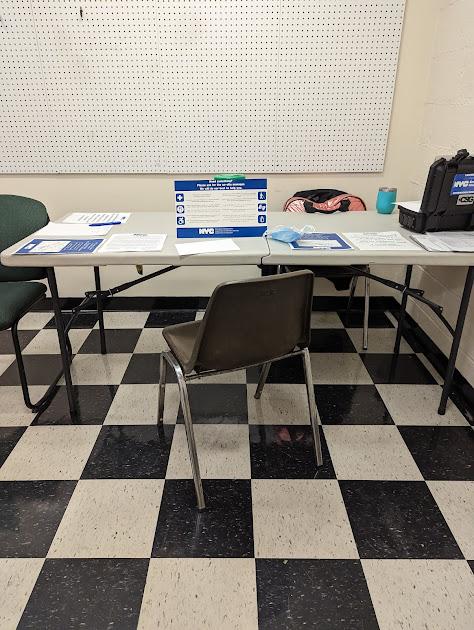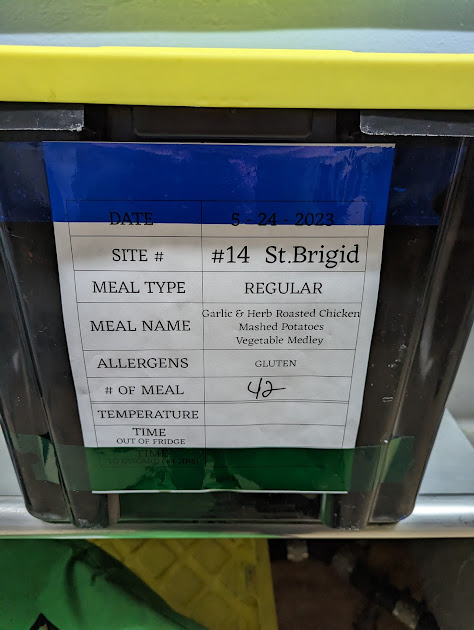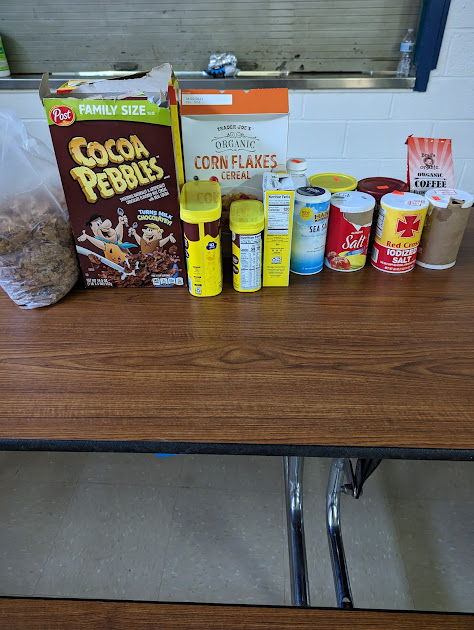Editor's note: To protect the asylum seekers, our published photos
do not include names, faces or personal details.
According to the online publication
The City, a half-dozen sites in NYC now serve as what the Adams administration refers to as respite centers for asylum seekers, including
the former St. Brigid’s School, which closed in the spring of 2019.
“They’re basically like waiting rooms until we can find a placement for somebody,” an official for Mayor Adams told The City.
After reading this article by Gwynne Hogan and Haidee Chu, I went to the school on Seventh Street and Avenue B —
last used by unvaccinated teachers to conduct remote learning — to see if I could help provide food, clothing, or personal care items for the hundreds of people expected here in the days and weeks ahead.
On my first trip, around 75 individuals had arrived at the destination. I had brought along donated items such as food and clothing, intending to inquire about the specific needs of new arrivals for their short-term stay.
However, it became apparent that the demand was immense at the center that first opened its doors this past Thursday. Many people arrived without shoes, and nearly everyone possessed only the clothes they wore, lacking any personal belongings.
Those fortunate enough to have phones were eager to locate a Wi-Fi connection to communicate with their families, yet the center had no access. The situation was distressing, with many people visibly upset and exhausted from their long journey. Some quietly approached me, requesting coffee or Tylenol to alleviate their headaches.
Most of the people I spoke with were Spanish or French speakers, and I met asylum seekers from Venezuela, Ecuador and Mauritania, among other locations.
The newcomers arrived to this space via MTA buses, and their numbers increased daily. (I was informed that the facility could accommodate up to 350 adults.) Upon arrival, they underwent a processing procedure at the center, receiving a lanyard and an ID card featuring a QR code.
They were then directed to the designated area where cots were placed and presented with a welcome packet.
The basement, which served as the primary location for the cots, was uncomfortably cold, and the only provisions provided by local officials were thin blankets adorned with the City of New York crest and small personal care kits.
There are bathrooms but no showers or laundry facilities. There is a kitchen, but it doesn’t have gas for cooking, as the building hasn't hosted students since the spring of 2019. Signs are directing people to shower at the Dry Dock Pool on 10th Street at Avenue D.
Security is understandably tight at the location, so it is suggested that we set up outside, and people can come to select what they need from what is available.
I am told repeatedly that “the city doesn’t want to draw attention to the facility,” but also staffers run out and whisper requests to me, “A refugee needs a cell phone; an old one is fine. Can we find her one?” ... “a postpartum mother needs special underwear; any way to source her some?” ... “We have a diabetic on site; is there a sugar substitute available?”
I volunteer to buy a hotplate so people can have coffee, but I am told it’s a liability, and the City doesn’t want the risk. My friend donates a coffeemaker, filters and coffee beans instead, but it’s never used. Again, I am told it’s a liability.
I started asking friends and neighbors for donated blankets, sweaters, sweatpants, or anything to keep people warm. I also asked the local food nonprofit
EVLovesNYC if they could help with a Sunday lunch, which was fortuitous, as the city’s planned meals never arrived that day.
We were initially invited inside to distribute meals (we had four meal kits: chicken, pork, veggie and vegan options), but soon after, the NYC Emergency Management site supervisor demanded we leave (and take all the food with us).
It’s a dichotomy, as the City is asking for help with the overwhelming influx (tens of thousands) of refugees and asylum-seekers expected in NYC. Still, city officials are also preventing community members from directly supporting the people in need. (According to The City article, the respite centers have opened with little notice to the surrounding communities.) I was told to “donate to Red Cross” or “the approved drop-off location for Manhattan at 518 W. 168th St.”
Tables will be outside during specific hours a few times a week with a Free Store of donated items.
If you’d like to help, donations of adult clothes (there are no children or infants at this location), bedding and towels, backpacks, and toiletries are welcome during four upcoming drop-off dates. Items can be brought to the office of State Assemblymember Harvey Epstein at 107-109 Avenue B at Seventh Street on the following dates and times:
• Thursday, June 1, 3-5:30 p.m.
• Tuesday, June 6, 10 a.m.-2 p.m.
• Thursday, June 8, 3-5:30 p.m.
• Tuesday, June 13, 10 a.m.-2 p.m.



























































